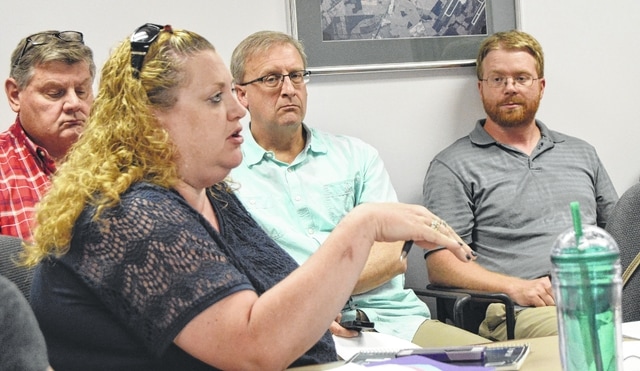
WILMINGTON — Members of Wilmington council’s judiciary committee determined Wednesday to have council decide whether to change how the Clinton County Convention and Visitors Bureau is funded.
Since last year, the committee has been considering adjusting the allocation of hotel lodging taxes.
Committee chair Randi Milburn said in the May meeting that no one could find legislation that created the current split – 90 percent to the CVB and 10 percent to the city’s general fund for administration.
In May, the judiciary committee said the current legislation calls for giving the CVB half of the lodging tax and that council should allot the other half.
The committee then asked for legislation to reiterate that current legislation.
“So we’ve been doing it wrong for 18 years?” council member Joe Spicer asked.
“Correct,” Milburn said.
“We’ve got some pretty dumb council people then,” Spicer said.
Debbie Stamper, executive director of the Clinton County Convention and Visitors Bureau, said she and the CVB board were taken aback by the committee’s suggested ordinance.
She said the total is $48,800 “out of a $300,000 annual budget, or one-sixth of our budget.”
“It is understood that the 50 percent withheld would be for other organizations to use to promote tourism,” Stamper said.
“We’re not earmarking money from the CVB to be given to other organizations,” Purkey said, after saying that the CVB could also apply for money from that other half of hotel taxes.
“This action is unwarranted in light of the fact that the CVB was established as the destination-marketing organization for the city 19 years ago and has been committed to this activity,” Stamper said, adding that the CVB is accountable for its spending and has doubled visitor spending to $83 million annually.
“By divvying up the lodging tax, the overall effect on tourism will be diluted and the momentum created over the years by the CVB will suffer,” Stamper said. “We ask that the amount to be withheld be reconsidered.”
CVB Treasurer Bob Hiatt took it further, saying “You guys have no idea what we’re doing behind the scenes” to support tourism groups.
“This is why we’re an independent organization,” Hiatt continued. “If every one of these guys that come to us for support that we support start coming to you, or we have to come to you to get them line-itemed in, you’ve just absolutely strapped us and made us totally ineffective.”
Hiatt also said reallocating the money would take $2 million out of the city’s economy – a claim that prompted questions from Purkey and Wilmington resident Tyler Williams. Hiatt said a tourist spends an average of $103 per day.
Doug DeVilbiss, president of the CVB’s board, asked if council was unhappy with the CVB’s efforts.
“I don’t believe that council is unhappy with the CVB,” said Milburn. “We have a new council, and this is not the first thing that we have gone in and cleaned up. … It’s always said this.”
“I think it’s healthy competition for funds as well,” said Miller. “It’s not that you can’t get it. … I know that the parks, I know Main Street Wilmington would love to have an opportunity to have a portion of these funds.”
Miller said there is an overlap of services and goals as well.
“There’s nothing wrong with healthy competition of funds,” Miller said.
“You’re defeating the purpose by having competition,” Stamper said. “We should all be working together.”
Spicer said MSW’s mission isn’t to promote tourism, even though its activities promote it. In those cases, he said MSW should coordinate with the CVB. Stamper said the two do often work together.
“My feeling is this money is way, way, way better spent promoting tourism to bring money into the city and the community and the county,” Spicer said. “We all know there’s an agenda here. … That 49 percent is going to go to pet projects.”
The discussion ended with a vote to present the legislation to all of council on July 21.
Committee member Kelsey Swindler was absent.
Reach Nathan Kraatz at 937-382-2574, ext. 2510 or on Twitter @NathanKraatz.


